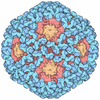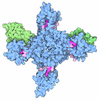+ Open data
Open data
- Basic information
Basic information
| Entry | Database: PDB / ID: 1jw4 | ||||||
|---|---|---|---|---|---|---|---|
| Title | Structure of ligand-free maltodextrin-binding protein | ||||||
 Components Components | maltodextrin-binding protein | ||||||
 Keywords Keywords | SUGAR BINDING PROTEIN | ||||||
| Function / homology |  Function and homology information Function and homology informationdetection of maltose stimulus / maltose transport complex / carbohydrate transport / carbohydrate transmembrane transporter activity / maltose binding / maltose transport / maltodextrin transmembrane transport / ATP-binding cassette (ABC) transporter complex, substrate-binding subunit-containing / ATP-binding cassette (ABC) transporter complex / cell chemotaxis ...detection of maltose stimulus / maltose transport complex / carbohydrate transport / carbohydrate transmembrane transporter activity / maltose binding / maltose transport / maltodextrin transmembrane transport / ATP-binding cassette (ABC) transporter complex, substrate-binding subunit-containing / ATP-binding cassette (ABC) transporter complex / cell chemotaxis / outer membrane-bounded periplasmic space / periplasmic space / DNA damage response / membrane Similarity search - Function | ||||||
| Biological species |  | ||||||
| Method |  X-RAY DIFFRACTION / Resolution: 2 Å X-RAY DIFFRACTION / Resolution: 2 Å | ||||||
 Authors Authors | Duan, X. / Quiocho, F.A. | ||||||
 Citation Citation |  Journal: Biochemistry / Year: 2002 Journal: Biochemistry / Year: 2002Title: Structural evidence for a dominant role of nonpolar interactions in the binding of a transport/chemosensory receptor to its highly polar ligands. Authors: Duan, X. / Quiocho, F.A. | ||||||
| History |
|
- Structure visualization
Structure visualization
| Structure viewer | Molecule:  Molmil Molmil Jmol/JSmol Jmol/JSmol |
|---|
- Downloads & links
Downloads & links
- Download
Download
| PDBx/mmCIF format |  1jw4.cif.gz 1jw4.cif.gz | 90.7 KB | Display |  PDBx/mmCIF format PDBx/mmCIF format |
|---|---|---|---|---|
| PDB format |  pdb1jw4.ent.gz pdb1jw4.ent.gz | 67.8 KB | Display |  PDB format PDB format |
| PDBx/mmJSON format |  1jw4.json.gz 1jw4.json.gz | Tree view |  PDBx/mmJSON format PDBx/mmJSON format | |
| Others |  Other downloads Other downloads |
-Validation report
| Summary document |  1jw4_validation.pdf.gz 1jw4_validation.pdf.gz | 361.7 KB | Display |  wwPDB validaton report wwPDB validaton report |
|---|---|---|---|---|
| Full document |  1jw4_full_validation.pdf.gz 1jw4_full_validation.pdf.gz | 368.3 KB | Display | |
| Data in XML |  1jw4_validation.xml.gz 1jw4_validation.xml.gz | 8.8 KB | Display | |
| Data in CIF |  1jw4_validation.cif.gz 1jw4_validation.cif.gz | 15 KB | Display | |
| Arichive directory |  https://data.pdbj.org/pub/pdb/validation_reports/jw/1jw4 https://data.pdbj.org/pub/pdb/validation_reports/jw/1jw4 ftp://data.pdbj.org/pub/pdb/validation_reports/jw/1jw4 ftp://data.pdbj.org/pub/pdb/validation_reports/jw/1jw4 | HTTPS FTP |
-Related structure data
- Links
Links
- Assembly
Assembly
| Deposited unit | 
| ||||||||
|---|---|---|---|---|---|---|---|---|---|
| 1 |
| ||||||||
| Unit cell |
|
- Components
Components
| #1: Protein | Mass: 40753.152 Da / Num. of mol.: 1 Source method: isolated from a genetically manipulated source Source: (gene. exp.)   |
|---|---|
| #2: Water | ChemComp-HOH / |
-Experimental details
-Experiment
| Experiment | Method:  X-RAY DIFFRACTION / Number of used crystals: 1 X-RAY DIFFRACTION / Number of used crystals: 1 |
|---|
- Sample preparation
Sample preparation
| Crystal | Density Matthews: 2.24 Å3/Da / Density % sol: 45.16 % | ||||||||||||||||||||||||||||||
|---|---|---|---|---|---|---|---|---|---|---|---|---|---|---|---|---|---|---|---|---|---|---|---|---|---|---|---|---|---|---|---|
| Crystal grow | Temperature: 298 K / Method: vapor diffusion, hanging drop / pH: 6.2 Details: PEG 20k, Mes, sodium azide, pH 6.2, VAPOR DIFFUSION, HANGING DROP | ||||||||||||||||||||||||||||||
| Crystal grow | *PLUS pH: 6.6 | ||||||||||||||||||||||||||||||
| Components of the solutions | *PLUS
|
-Data collection
| Diffraction | Mean temperature: 200 K |
|---|---|
| Diffraction source | Source:  ROTATING ANODE / Type: RIGAKU RU200 ROTATING ANODE / Type: RIGAKU RU200 |
| Detector | Type: MACSCIENCE / Detector: IMAGE PLATE / Date: Nov 8, 1999 |
| Radiation | Protocol: SINGLE WAVELENGTH / Monochromatic (M) / Laue (L): M / Scattering type: x-ray |
| Radiation wavelength | Relative weight: 1 |
| Reflection | Resolution: 1.9→10 Å / Num. obs: 24467 / % possible obs: 87.7 % / Observed criterion σ(I): 0 / Redundancy: 1.7 % / Rmerge(I) obs: 0.043 / Net I/σ(I): 16 |
| Reflection shell | Resolution: 1.9→1.97 Å / Redundancy: 1.3 % / Rmerge(I) obs: 0.165 / % possible all: 57.9 |
| Reflection | *PLUS Highest resolution: 2 Å / Redundancy: 1.6 % |
- Processing
Processing
| Software |
| ||||||||||||||||||||
|---|---|---|---|---|---|---|---|---|---|---|---|---|---|---|---|---|---|---|---|---|---|
| Refinement | Resolution: 2→50 Å / σ(F): 2
| ||||||||||||||||||||
| Refinement step | Cycle: LAST / Resolution: 2→50 Å
| ||||||||||||||||||||
| Refine LS restraints |
| ||||||||||||||||||||
| Software | *PLUS Name: CNS / Classification: refinement | ||||||||||||||||||||
| Refinement | *PLUS Highest resolution: 2 Å / Lowest resolution: 50 Å / σ(F): 2 / Rfactor obs: 0.2 / Rfactor Rfree: 0.26 / Rfactor Rwork: 0.2 | ||||||||||||||||||||
| Solvent computation | *PLUS | ||||||||||||||||||||
| Displacement parameters | *PLUS | ||||||||||||||||||||
| Refine LS restraints | *PLUS Type: c_bond_d / Dev ideal: 0.01 |
 Movie
Movie Controller
Controller




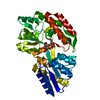
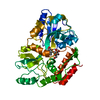

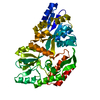

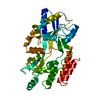


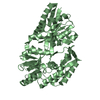
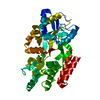
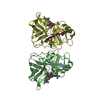

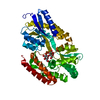
 PDBj
PDBj
